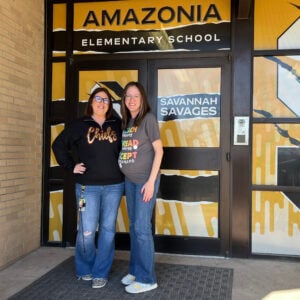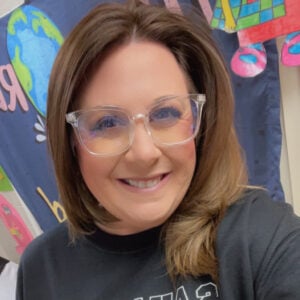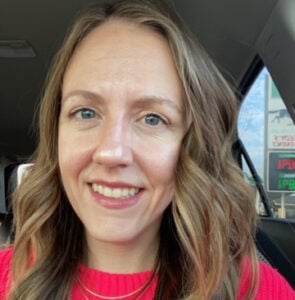Mandy Crider and Dara Shanks have a lot in common, including a new career they both love.
They met two years ago when Crider was a special education paraeducator at Amazonia Elementary, a small campus of around 100 students in Missouri’s Savannah R-III School

District. Shanks was hired for the same role in another classroom, and they often collaborated in supporting students. Now, they are going through their first year as special education teachers together.
Shanks is the campus essential skills instructor, working with young students who experience intellectual or developmental disabilities. Crider teaches K-5 special education, working with students who may experience a range of significant disabilities. Shanks focuses on functional academics and adaptive skills while Crider focuses on learning and academics.
The collaborative teaching practice they are developing helps ensure students at every grade level receive consistent, holistic support. “This year, we have been working together more as a whole with special education students as co-teachers,” Crider explained, “and we meet to discuss our goals for the kids and what we are doing or going to do.”
Each is teaching on a Missouri Temporary Authorization Certificate while completing the Northwest Missouri State University online Master of Science in Education in Special Education with Certification program. Shanks enrolled in May 2023 and Crider in June. Both expect to complete their degree this year.
“We’ve been able to bounce [ideas] off each other and have taken a lot of the classes at the same time,” Shanks said. “It’s been really good,” Crider confirmed.
Crider comes from a long line of Northwest graduates and is a Bearcat alum herself. Although she had never studied online before, she says doing so at her alma mater has been a good experience.
“I wouldn’t be able to go do all that I needed to do if I had to be there in person,” she said. “It’s allowed me a lot of extra flexibility to get online when I need to and to work at my own pace. I don’t feel rushed.
Shanks chose the program for its convenience and to achieve certification without having to earn a second bachelor’s degree. “I needed to be able to go to school online and still be able to work a full-time job,” she said. “Northwest had this program where I could get my master’s and become a teacher at the same time.”
From Paraprofessionals to Instructor
Crider lives in Mound City, Missouri and Shanks resides in nearby St. Joseph. They share a talent and affinity for working with kids, though their path to becoming teachers has been different.

Crider earned a bachelor’s in political science from Northwest in 2008 but pivoted to education after finding a tight job market in her degree field. She worked as a special education paraprofessional for 12 years while also raising her daughters, Emma and Maycee. During that period, Crider declined teaching opportunities that came her way because she wanted more time for her kids and their activities.
When the special education teacher she supported in the classroom retired last year, the moment was finally right. With Emma (20) in college and Maycee (14) starting high school, she felt comfortable stepping into the role.
“Once I got into it, I really enjoyed it and couldn’t really see myself anywhere else,” she said.
Shanks earned a bachelor’s in psychology from Missouri Western State University in 2013 and got her start in education as a mental health professional. “I worked in a program that was built like a classroom, but we weren’t focused on academics,” she said. “It was how to behave in a classroom.”
When that program closed, she became a preschool paraprofessional and considered her options. “I wanted to go back to school to become a teacher,” she remembered. Encouragement from her administrators and peers at Amazonia made the decision to pursue certification easier.
“I love the district,” Shanks said. “There’s lots of support, especially for someone like myself who is a first-year teacher but also trying to juggle school at the same time.”
She enjoys helping her students adapt to the educational environment and work through communication or behavioral challenges. “We have so much fun in my classroom,” she confided. “You become such a big part of the students’ lives. … Just the amazing growth you get to see, and you’re like, ‘Wow, I had a part in that.'”
Expanding Knowledge, Applying New Skills
Crider and Shanks have been pleasantly surprised by how the online MSEd. in Special Education program integrates theory, pedagogy and best practices, in addition to fostering their personal growth.

Shanks says she was expecting more emphasis on exams and to “drill, drill, drill” based on her previous college classes. She quickly realized her master’s experience would be different. “I was shocked,” she recalled. “It’s not just repeat, review, take a test.” She appreciates that professors stress reflective learning and real-world applications instead.
“The content that I get from Northwest has been very valuable. It’s all things that I can take to the classroom and apply and use, and I also get to connect with other professionals that do what I do,” she said. “It’s really just helped me be a reflective person, not only in my teaching, but in my life as well.”
Crider agrees. “Every class that I have taken has coincided with something that has come up in my own classroom,” she shared. “I can use whatever I’ve learned in that class back with my kids.”
From the first course—Introduction to Special Education—Crider also gained an appreciation for the full scope of her new job. “That was a huge eye-opener,” she admitted. “I thought I knew a lot about special education, and then once I got into that class, I realized there’s so much more to it.”
She understood the benefits of Individualized Education Plans (IEPs), for instance, and helped teachers implement them. “But I’d never written one,” she conceded. Crider learned how to create IEPs and build consensus among the diverse stakeholders who are part of the process, which may include students, parents/guardians, teachers, psychologists and other relevant parties.
The Student Evaluation and Assessment course appealed to Crider and Shanks as well, expanding the range of informal methods they use for measuring student progress.
“I think it’s interesting to see how students look on a test, and then comparing them to how they work with me,” Crider said, noting that standard evaluation methods don’t always fit children with disabilities or capture what they’ve learned. “That class is specifically giving me reassurance and strategies for assessing my students that meet their needs,” Shanks confirmed.
Studying with professors who understand and advocate for special ed teachers has also been a good part of the experience for both. “I definitely feel like they’re there for us and they have our back in whatever we do,” Crider said.
Empowering Students and Teachers to Succeed
As demand for K-12 special education professionals continues to rise, Shanks hopes more prospective teachers will seize the opportunity to prepare for certification online in a master’s program. “[If] you’re kind of stuck between a rock and a hard place like I was—I want to be a teacher, but I don’t want to go all the way back to school and start all over again—this is the way to go,” she advised.
Crider would like to see more paraeducators in the field advance, bringing their experience and perspective to teaching. She is now in a better position to address broader issues her students may deal with, such as misinformation or assumptions about children with disabilities that can impact investment in their future.
“They all have this potential that I feel like some teachers just can’t see,” she lamented, highlighting the progress she observes in her students every day. Shanks agrees. “The life skills, those social things that you get to witness that people don’t see on paper,” she noted, are part of learning too.
Shanks plans to keep teaching after completing her degree, but she’s glad that having a master’s will give her options for moving up. “It could help with that if someday I decided to change my mind and wanted to go into administration,” she said.
Crider will also stay in the classroom and hopes to serve as a part-time professor in her graduate program eventually. “I would like to give back to the school,” she said, emphasizing all that studying at Northwest through the years has given her. However, she believes the lessons she’s passing on at home are just as important.
“Having your master’s, that’s a huge thing that I never thought would really happen for me because I was a single mom with my first daughter when I started my undergrad,” she remembered. “I just want to show her and my younger daughter you can get your master’s, and don’t ever let anybody tell you [that] you can’t do it.”
She and Shanks have learned from experience never to underestimate a student, or education’s ability to change lives. Theirs included.
“It’s been the best thing I ever could have done for myself and my family,” Crider said.